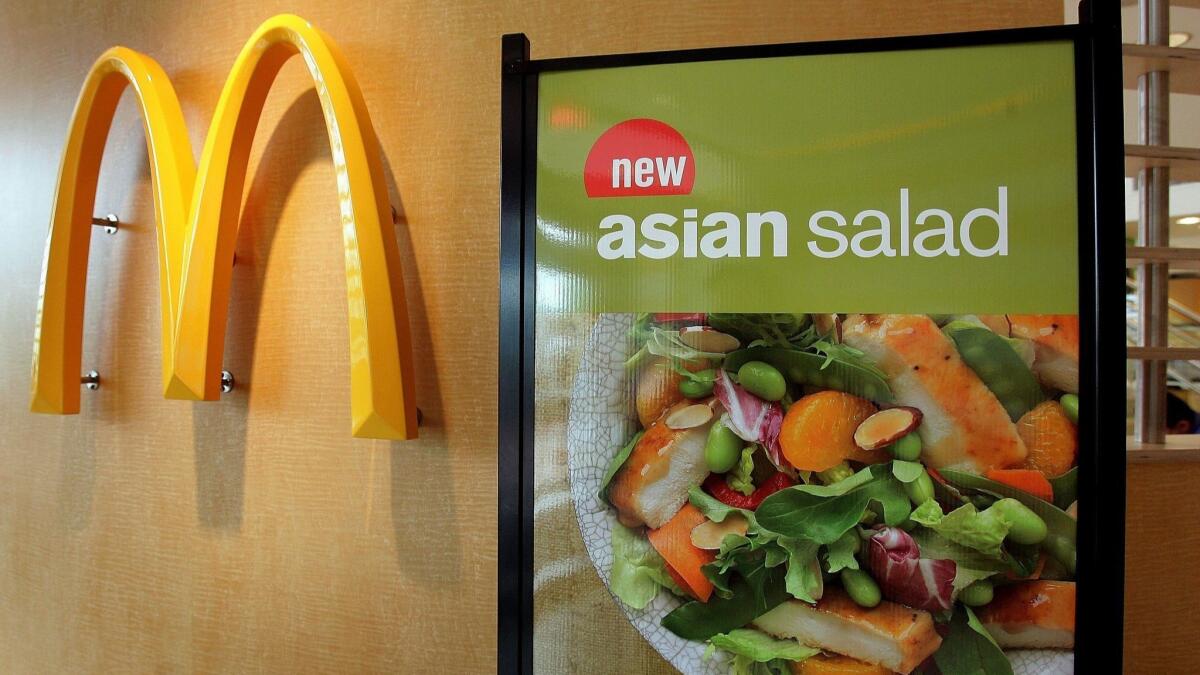Tainted McDonald’s and grocery-store salads linked to California produce company, FDA says

- Share via
A California produce company has been linked to a multistate outbreak of illnesses from parasites found in wholesale bagged salad mixes, according to the U.S. Food and Drug Administration.
Fresh Express, based in Salinas, supplied bagged salad mixes tainted with cyclospora to McDonald’s franchises in the Midwest, where health authorities in two states reported at least 286 customers of the fast-food chain were sickened, the FDA said. McDonald’s was forced last month to halt salad sales at 3,000 regional franchises as a precaution, and changed its supplier.
FDA laboratory tests last week confirmed the presence of cyclospora parasites in an unused portion of romaine-and-carrot mix that McDonald’s received from a Fresh Express packaging plant in Illinois.
Fresh Express tracked romaine lettuce from the same facility and lot number to Caito Foods, of Indianapolis, which sells a variety of packaged foods to retail stores, including Trader Joe’s, Kroger (owner of Ralphs groceries) and Walmart.
The U.S. Department of Agriculture this week issued a public health warning to consumers to check for any salads, wraps and other packaged items that may be from the same Caito batch — all of which are beyond their recommended consumption dates of July 18 to July 23.
Fresh Express and its parent company, Chiquita Brands, did not respond to requests for comment Thursday. On its website, Fresh Express says the recall involved “a limited number of cases of expired product not marked or labeled for retail sale.”
“The Fresh Express food safety team, along with our outside food safety experts, have collaborated closely with FDA, the US Centers for Disease Control and Prevention and state public health agencies in their outbreak investigations, and we continue to do so,” the statement said. “As of now, there is no clear understanding about the contamination pathway or the definitive source of infection.”
The illness caused by infestation with the parasite, known as cyclosporiasis, is marked by severe and frequent bouts of diarrhea, cramps, bloating, nausea, fever, and loss of appetite and weight, according to the Centers for Disease Control and Prevention.
The CDC has reported 286 laboratory-confirmed cases of cyclosporiasis in Connecticut, Florida, Iowa, Illinois, Indiana, Kentucky, Minnesota, Michigan, Montana, Nebraska, Ohio, South Dakota, Tennessee, Virginia and Wisconsin.
The cases are centered in Illinois and Iowa, according to CDC, which noted that multiple patients outside the Midwest reported traveling and eating at McDonald’s outlets in Illinois and Kentucky.
CDC has not confirmed any illnesses linked to the Caito recall. Nor is there an apparent link to a cyclospora outbreak involving salad trays sold by Del Monte Fresh Produce, which apparently sickened 237 people who ate vegetable-and-dip trays bought in convenience stores in Wisconsin, Minnesota, Iowa and Michigan.
Cyclospora parasites are specific to humans, and usually are spread through poorly treated sewage that makes its way to crop irrigation sources, often in growing areas outside the U.S.
Cases involving the parasite have been on the rise, according to CDC, which reported more than 1,065 cases in 40 states last year. There were 384 cases reported during a similar period in 2016, compared with 546 in 2015 and 304 in 2014, according to the CDC.
Romaine lettuce also was at the center of an outbreak earlier this year involving a virulent strain of E. coli bacteria, ultimately traced to an irrigation ditch near Yuma, Arizona. That 36-state outbreak, the largest in more than a decade, killed five people and sickened more than 200 others, about half of whom had to be hospitalized, according to the CDC.
Follow me: @LATgeoffmohan
More to Read
Inside the business of entertainment
The Wide Shot brings you news, analysis and insights on everything from streaming wars to production — and what it all means for the future.
You may occasionally receive promotional content from the Los Angeles Times.











